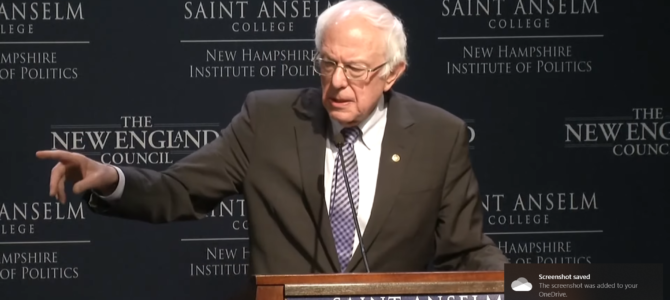Since 1996, the New England Council and the New Hampshire Institute of Politics & Political Library at Saint Anselm College have teamed up to offer breakfast sessions for local New Hampshire business leaders to meet presidential candidates. Friday morning, as part of the “Politics and Eggs” series, Sen. Bernie Sanders of Vermont spoke to a packed room of well-clad listeners from both New Hampshire and surrounding states, offering what many would likely interpret as a response to President Trump’s economically optimistic State of the Union address.
In the same way President Trump opened his State of the Union address with a discussion of the booming Trump economy, Sanders thundered back his own narrative of what he saw to be entirely failing economic system.
Primary events serve as de facto laboratories, allowing arguments to be tested before the party nominee assumes the mantle, and today was no exception. Arguments made by candidates make now may reveal talking points likely to be lodged in the general election.
“If you are the average American worker, despite huge increases in technology and productivity over the last 45 years, today you are not earning a nickel more in real inflation-accounted-for dollars than you did 45 years ago. Why is that?” asked Sanders with his classic arms up exasperatedly move.
Repeating this refrain several times to a somber audience, the Vermont senator failed to articulate that what has arguably remained stagnant is not precisely wages, but rather purchasing power. And even then, as economist Michael Strain of the American Enterprise Institute notes, the farther back you go, the more imperfect this metric becomes.
Making apples-to-apples comparisons of the purchasing power of wages becomes much more difficult the further back you go. How do you compare the price of a car in 2019 with one in 1973, given the significant improvements in automobiles? How do you compare the price of a laptop in 2019 with one in 1973, given that none existed in the 1970s?
But time isn’t the only variable that may significantly impact such statistics. When accounting for inflation, whether one uses the Consumer Price Index (CPI) or the Personal Consumption Expenditures (PCE) price index, they can produce dramatically different results. The PCE accounts for the ability of individuals to substitute different goods and services in response to changes in prices and thus, may actually tell a more nuanced story than the CPI. As Strain notes, “Using the PCE, the wages of a typical worker have increased by 32% over the past three decades. That’s a significant increase in purchasing power.” (emphasis added)
In addition to going after wages, Sanders’ other tack was to take up the usual banner of attacking economic inequality, declaring righteously, “We have more income and wealth inequality than we’ve had in 100 years.” Though economic inequality remains the original sin of the left, disparities in income are not inherently evil – in fact, you can have a society with virtually no income inequality and high levels of destitution. What many economists will tell you is that absolute growth is more important than relative growth.
The income inequality refrain, combined with the narrative of stagnant wages, will be used to detract from Trump’s argument that the economy is doing great, but it may not be enough. According to recent polling performed by Gallup, nearly six in 10 Americans say that they are better off financially than they were just a year prior, a value matching the rate of economic satisfaction experienced during the dot-com boom.
Similarly, economic optimism is up, with nearly three in four U.S. adults reporting that they predict they will be better off financially in the coming year, the highest value since 1977. The unemployment rate has reached all-time lows since unemployment rates were first recorded. Coincidentally, at the precise time Sanders railed against the economy, the Labor Department reported Friday morning that job growth in January exceeded expectations by nearly 70,000 jobs. That’s nothing to shrug at, and Democrats are making a misstep by purposely ignoring the good.
None of this is to say that the economy is in perfect shape. Yet, given the economic trends as of late, Democrats will have their work cut out for them in the 2020 election, especially if they opt to run an anti-capitalist on the ticket. But Bernie’s latest speech seems to offer a glimpse as to what we might expect the Democrats’ talking points to be in the 2020 election, as they go head-to-head against an economy that’s riding a wave of approval it hasn’t seen in decades.
Admittedly, to suggest to your voters that their prosperity isn’t so great is a strange argument to make, and may not hold its weight in the general. If Democrats are serious about winning, they’re going to have to devise a better argument than, “Don’t believe your lying eyes.”









